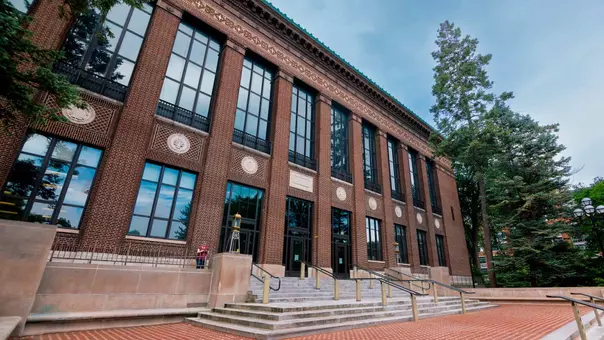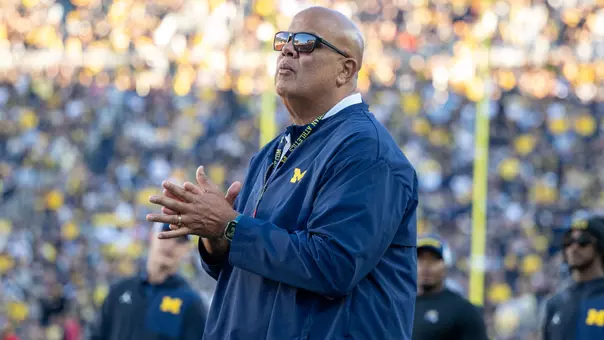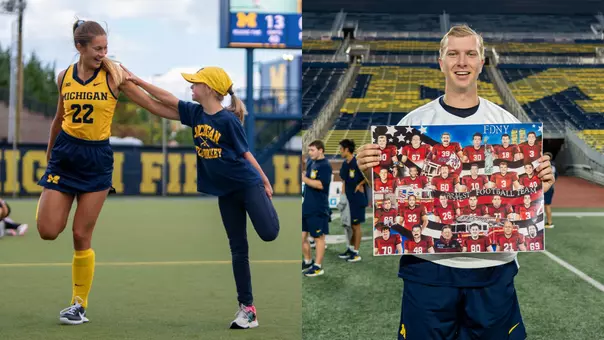Press Conference on NCAA Sanctions -- Bill Martin
5/8/2003 12:00:00 AM | General
Comments from U-M Press Conference
NCAA Men's Basketball Infractions Committee Report
Bill Martin, U-M Director of Athletics
Opening statement ... "Thank you, President (Mary Sue) Coleman, and good afternoon. Thank you to all for coming. It's certainly been a long time to get to this point today. We have said time and time again that our goal has been to get to the truth and to do whatever it takes to ensure we have a program fully in compliance with NCAA rules. Everything we have done has been with that single goal in mind. The infractions, as you know, and you heard Commissioner (Tom) Yaeger mention earlier this afternoon, date back to the early '90s. Some of the relationships that Ed Martin and our players had date back to high school and even middle school and those relationships were with their family in many instances. In 1996 when events led us to begin our first of three investigations, those involved would not cooperate. And we were not able to get to the truth. Only an unrelated federal investigation of Ed Martin allowed us to finally uncover the details. In the end, we conducted three separate investigations. We worked cooperatively with both the Big Ten and the NCAA in every one of those investigations. You heard Tom Yaeger affirm that fact. We have included the NCAA throughout this process and we will continue to do so as we move forward through the appeal process.
| |
"I mentioned that we worked closely with the NCAA in every phase of our investigation. Ed Martin's plea agreement with the federal government finally enabled us, together with the NCAA staff, to be debriefed by his attorneys. We promptly and fully reported what we found and we imposed thorough and appropriate sanctions upon ourself. Those sanctions were:
- Vacating 114 games, including two Final Fours;
- Removing four championship banners from Crisler Arena;
- Returning to the NCAA the monies we received from postseason play with ineligible players;
- Removing ourselves from postseason play for one year;
- And putting our men's basketball program on probation for two years.
"We imposed these sanctions because we thought it was simply the right thing to do. We made a deliberate decision to announce sanctions publicly because we thought it would set a positive example for accountability. As President Coleman stated, we will appeal only the extra year's postseason ban. We believe the additional postseason ban is counter to the core mission of the NCAA enforcement. This is from the NCAA bylaws and I'm quoting directly:
'An important consideration in imposing penalties is to provide fairness to uninvolved student-athletes, coaches, administrators, competitors and other institutions.'
"Our current student-athletes were not involved in any way, as weren't our entire coaching staff. All they did was play their guts out this season knowing they couldn't go to the Big Dance. I hope we can balance the need for punishment with the value for fairness. I'm very proud of coach Tommy Amaker and all that the team has accomplished this year. These young men have held their heads high in the face of an extremely difficult situation. The institution has worked hard. President Coleman did the right thing this year, and now we're looking forward to what's ahead. Thank you."
On the LSU appeal ... "In the LSU case, the committee on infractions had imposed a one-year ban on postseason play and the appeals committee overturned it, and they cited the same reason I mentioned earlier. How equitable is it to penalize young men who weren't here when the infractions took place"
Is there any indication that the players are willing to stay at Michigan ... "Tommy met with six players who are still in town last night at 6:00. They are enthusiastically supporting the program. They are all staying. They support the coach, as President Coleman and myself do. They'll be here and we're going to have a great year going forward."
Should the committee have punished former coach Steve Fisher in some way ... "I'm not going to comment on Steve Fisher, but I will say this about the infractions committee. We all felt this was a group of our peers from across the country. They were very well prepared when we went before them. We have nothing but the highest respect for them and their end product, other than the one additional year of postseason ban."
What further can the school do to disassociate from the former athletes ... "I think you heard Commissioner Yaeger say that the 10-year disassociation was the maximum penalty the NCAA has ever imposed on a former player in terms of disassociation. With respect to that, our hands are tied. We have to do what the NCAA says. I would say, on the other hand, if those players wanted to come forward with any information to pass on to the NCAA as to why we might not want to ban them, we would certainly be open to hearing it."
Is the system broke when innocent kids have to sit out a year or two but some of the adults are still working in high-profile positions ... "The short answer is we don't like that. Nobody likes that. As you heard Commissioner Yeager say, they have to work on the facts and the evidence on the case to determine penalties and who is in receipt of those penalties."
Is there anything in this to discourage coaches in the future from looking the other way or players from taking money ... "I think the infractions committee has sent a tremendous loud message across the country today. They cited this case as being one of the three most severe cases in history of the infractions program at the NCAA. I can't give specific answers to that. I just know what we're going to do here at Michigan. I've got my blinders on, we're focusing on our program. It will be a model program. I believe in transparency with respect to all of our compliance procedures. We need to move forward. I always believe the first and most important job of an athletic director is to hire coaches of honor and integrity who can win the right way. In Tommy Amaker we have a coach of that character."
In your appeal, what will you emphasize ... "Bruce Madej has available a page out of the NCAA bylaws that talks about their mission and the fundamental core principle I quoted from in my prepared remarks. Specifically states they are interested in fairness by not imposing additional penalties on student-athletes that were uninvolved in the infractions that took place. And it is solely on that basis."
Is there a statute of limitations on this ... "The institution, when the facts are known and a decision is made, has to stand up and accept responsibility. We've heard President Coleman say time and time again today and last November that we were prepared to do it. There are statutes of limitations involved in these cases, but they did not apply in this case. We want to get this behind us. We're very proud of the institution, we're proud of the process we followed. As I've said before, we're very satisfied with our peers' review of us. They did an outstanding job. They put a lot of time into that process. Yes it took longer than the first 5-7 weeks and then it became 6-8 weeks, what did it take 10 weeks before it was out"
Contact: Bruce Madej (734) 763-4423










